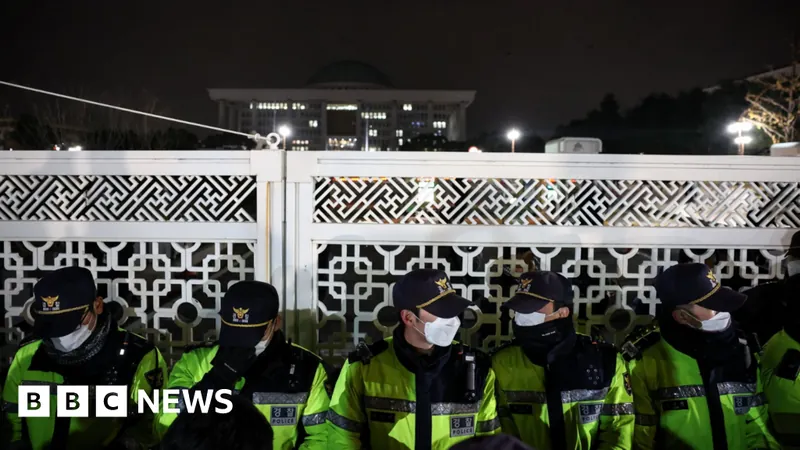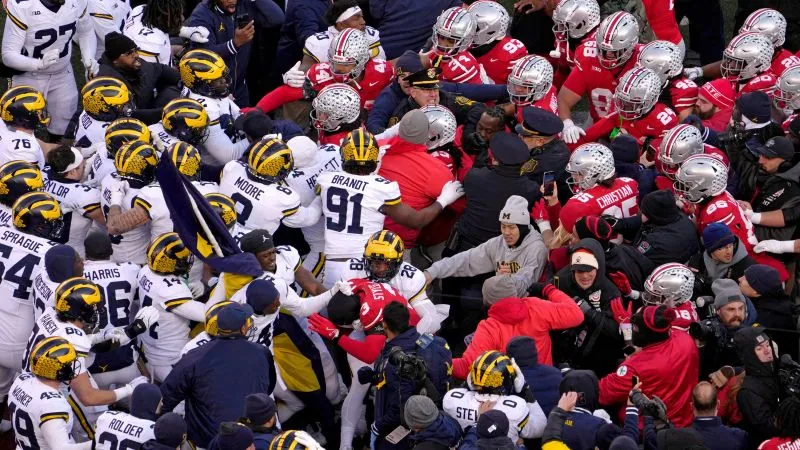
Sudden Martial Law in South Korea: Why President Yoon's Alarming Move Has the Nation on Edge
2024-12-03
Author: Jia
In an unprecedented and shocking turn of events, South Korean President Yoon Suk-yeol declared martial law late Tuesday night, marking the first such action in nearly half a century. This drastic announcement, made during a late-night television address, cited threats from "anti-state forces" and North Korea as justifications for his decision. However, it soon became evident that internal political turmoil was the true catalyst behind this controversial move.
What followed was a wave of protests, with thousands gathering outside the parliament to voice their dissent against the martial law order. Opposition lawmakers rallied urgently to organize an emergency vote to overturn the measure, a testament to their resolve against what they deem an overreach of power.
President Yoon's eerie display of power included deploying military personnel to the National Assembly, where scenes of armed troops clashing with parliamentary staff painted a dramatic picture of the crisis. Just after 1 AM on Wednesday, the parliament, with 190 of its 300 members present, voted to annul the martial law declaration, deeming it illegal and unconstitutional. Yoon soon acquiesced to the parliamentary decision, lifting the contentious order.
Martial law, defined as military rule imposed during emergencies when civilian authorities are unable to maintain order, has not been declared in South Korea since 1979—a clear signal of its severity. At that time, it followed the assassination of military dictator Park Chung-hee.
President Yoon, often criticized for his hardline stance against North Korea, characterized the political opposition as sympathizers of the North without offering substantial evidence. His perceived draconian measures raised alarm bells across the nation, especially given recent events that spotlight the fragility of South Korea's democratic institutions.
Yoon's political standing has been under significant pressure, with his approval ratings plummeting to around 17%, compounded by a series of corruption scandals involving high-profile figures in his administration, including the First Lady. Just weeks ago, his government faced a proposal from the opposition that sought to cut a critical government budget bill, underscoring the deepening political rift.
The circumstances surrounding the martial law declaration left many South Koreans bewildered and concerned about the future of their democracy. Critics argue that this incident poses a serious threat not only to South Korea’s political landscape but also to its reputation as a vibrant democracy on the global stage.
Experts weigh in on the fallout, stating the martial law move could potentially have more damaging implications for South Korea's democratic integrity than similar events observed in other parts of the world, such as the Capitol riots on January 6th in the United States.
As the nation grapples with the implications of Yoon's abrupt decision, the question remains: what will be the lasting impact on the political fabric of South Korea? Will this serve as a catalyst for long-term reforms, or will it spiral into further unrest? And crucially, will President Yoon's controversial decision lead to calls for accountability and potential shifts in power? The outcome of these developments could redefine the future of governance in South Korea, a democratic society that prides itself on its progress since the days of military rule.

 Brasil (PT)
Brasil (PT)
 Canada (EN)
Canada (EN)
 Chile (ES)
Chile (ES)
 España (ES)
España (ES)
 France (FR)
France (FR)
 Hong Kong (EN)
Hong Kong (EN)
 Italia (IT)
Italia (IT)
 日本 (JA)
日本 (JA)
 Magyarország (HU)
Magyarország (HU)
 Norge (NO)
Norge (NO)
 Polska (PL)
Polska (PL)
 Schweiz (DE)
Schweiz (DE)
 Singapore (EN)
Singapore (EN)
 Sverige (SV)
Sverige (SV)
 Suomi (FI)
Suomi (FI)
 Türkiye (TR)
Türkiye (TR)